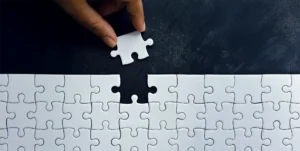If Jesus really is the Messiah, how come there is still war? After all, didn’t the prophet Isaiah say,
“The wolf shall dwell with the lamb, and the leopard shall lie down with the young goat” (Isaiah 11:6)?
Isn’t the coming of the Messiah supposed to bring world peace?
Rabbi Tovia Singer argues, “If Jesus were the Messiah, you would know it from reading the newspaper, because the front page, instead of being about wars, would be about peace. But since Jesus’ time until today, more than one hundred and twenty million people have died in wars.”
In addition, Rabbi Yossi Mizrachi says that when the Messiah will come, “There will be no more wars in the world, everyone will dwell in peace and the wolf shall dwell with the lamb.”
First of all, it’s important to understand there is no verse in the Bible that says, “When the Messiah comes, there will be peace.” However, it is true that there is a connection between the Messiah and peace – but, at a specific time and in specific context. The Messiah has different roles that must be fulfilled at different times. For example, the prophet Malachi wrote that the Messiah will refine and purify. In other words, before he establishes peace, he will judge and fight.
There are two main reasons for the rabbinic confusion concerning the Messiah. First of all, the rabbis don’t rely on the Bible anymore, but on traditions from the Rabbinic literature (Talmud), which causes them to get confused among themselves about everything concerning the Messiah: his coming, the roles he plays, and his identity.
- For example, Rabbi Yochanan claimed the Messiah will come when the Jewish people will succeed in keeping two Sabbaths.
- Rabbi Uziel Eliyahu claims it’s impossible to know what will happen when the Messiah comes, saying: “When the King Messiah comes we won’t know what will happen until it happens.”
- On the other hand, Rabbi Ya’akov Halevi Filber said that the coming of the Messiah depends on us, the Jewish people, and our good behavior.
- Rabbi Yitzhak Kaduri said the Messiah already came nine years ago.
- Rabbi Ovadiah Yosef said that when the Messiah comes, he will wipe out all the Arabs.
- Rabbi Haim Levi Yizhak Ginsburg claimed the Messiah is the Lubavitch rebbe, who died more than twenty years ago.
- Rabbi Obadiah Bartenura wrote that in every generation, a type of Messiah is born.
- Rabbi Akiva claimed Bar-Kochva was the Messiah, whereas Reform Judaism claims “the Messiah” is an era [not a person].
You see, the timing and roles of the Messiah according to the rabbis are so mixed up and confused that it’s impossible to know which rabbi to believe.
The second reason for the confusion is that in the Bible itself there are different descriptions of the different roles the Messiah plays.
On the one hand, it is written that the Messiah is to be rejected, suffer, and die.
On the other hand, it is written that the Messiah is to fight and judge.
It is also written that the Messiah is to establish world peace.
Sounds confusing, right?
So much so, that in the Jewish Talmud there is an argument between the rabbis concerning the question, “Will the Messiah come humbly riding on a donkey or will he come as a warrior-king in the clouds?” There were even rabbis who suggested that the Messiah would come in the clouds riding on a flying donkey! The attempt to combine the different descriptions of the Messiah in the Bible was the cause for such great confusion amidst the Jewish sages.
And later, it was taught that the Bible does not speak of one Messiah but of two different Messiahs: one who will come first, will suffer, be rejected, and die, and therefore is called “Messiah Son of Joseph”; and a second one who will come after him, to reign and establish world peace, and therefore is called “Messiah Son of David.” But the truth is, the Bible never speaks of two different Messiahs but of one Messiah having two different roles at different times. The one role of “Messiah son of Joseph,” which took place in His first coming two thousand years ago, when He was rejected, suffered, and died because of, and for the sake of; our sins.
As opposed to our rabbis today, during the time of early Judaism, even before the time of Jesus, Judaism believed the Bible spoke of only one Messiah, not of two.
Researchers Wise and Tabor describe the belief that was held by the ancient Jewish people in their thesis based on the Qumran scrolls. According to them, the Jewish community in Qumran during the third century B.C.E. believed that “At first the Messiah will suffer and be defeated, but in the end he will rule and triumph in the last day.”
In other words, establishing world peace will be the Messiah’s last step, in his second coming in the last days.
The Messiah’s first role, fulfilled before the destruction of the temple two thousand years ago, was to replace the lamb that was sacrificed for our sins. Just as the lamb was perfect, the Messiah had to be perfect as well.
But no man is perfect; only God is perfect. That is why the Messiah has to be God Himself.
Only He can atone for our sins, and, no, this isn’t a foreign “Christian” line of thought, but a completely Jewish one!
Rabbi Menachem Brod writes: “Through his sufferings, the Messiah atones for his generation and enables every Jew to receive salvation “as it says: ‘Surely he has borne our griefs and carried our sorrows… he was pierced for our transgressions; he was crushed for our iniquities.’” Rabbi Brod writes this based on Isaiah 53.
In the rabbinic Jewish book of Zohar, it is written that through the sufferings of the Messiah Israel is saved from judgment. This also is based on Isaiah 53.
The Ramban [Nachmanides] also interpreted Isaiah 53 to be about the Messiah: “The stripes by which he is vexed and distressed will heal us: God will pardon us for his righteousness, and we shall be healed both from our own transgressions and from the iniquities of our fathers.”
(By the way, we’ve devoted an entire video to explain the prophecy of Isaiah chapter 53.)
Rabbi Moshe Alshich adds that the Messiah accepts the sufferings willingly. “Because he himself desires to bear them… and we esteemed that he would not take them himself but that he was stricken, smitten by God. But when the time comes that he will be revealed in all his majesty then all will see and understand how great is the strength of the one who suffers torments for that generation.”
The prophet Zechariah (chapter 12) also prophesies, that the Messiah will die by the piercing or the stabbing of his body. and in his death, he will take our transgressions upon himself.
“And I will pour out on the house of David and the inhabitants of Jerusalem a spirit of grace and pleas for mercy, so that, when they look on me, on him whom they have pierced, they shall mourn for him, as one mourns for an only child, and weep bitterly over him, as one weeps over a firstborn.”
Zechariah prophesied that one day our Jewish people will understand that we have pierced our Messiah and we will mourn as one mourns over the death of a firstborn son.
Rabbinic Midrash “Yalkut Shimoni” attests: “It is clear that the Messiah, the Son of Joseph, is killed as it is written: “‘And they will look on me, on him whom they have pierced…'”
Rabbi Moshe Alshich adds to this, saying: “‘They shall look unto me’, for they shall lift up their eyes unto me in perfect repentance, “when they see him whom they pierced, that is, Messiah, the Son of Joseph; …he will take upon himself all the guilt of Israel.” Rashi, in ‘Tractate Sukkah’ 52 interprets Zechariah 12:10 and says, “And the land will mourn as in the prophecy of Zechariah, which prophesied of the future, that they will mourn for the Messiah son of Joseph that was killed….”
(We’ve also devoted an another entire video to explain the prophecy in Zechariah 12.)
There is no doubt that the idea of a Messiah who suffers for our sins is embedded deeply in the Jewish way of thinking. Jewish historian Dr. Raphael Patai concludes: “Despised and afflicted with unhealing wounds, he sits in the gates of Great Rome and winds and unwinds the bandages of his festering sores; as a Midrash expresses it, ‘pains have adopted him. According to one of the most moving, and at the same time psychologically most meaningful, of all Messiah legends, God, when He created the Messiah, gave him the choice of whether or not to accept the sufferings for the sins of Israel. And the Messiah answered, “I accept it with joy, so that not a single soul of Israel should perish.”
In the later, Zoharic (mystical) formulation of this legend, the Messiah himself summons all the diseases, pains, and sufferings of Israel to come upon him, in order thus to ease the anguish of Israel, which otherwise would be unbearable.” (Dr. Raphael Patai)
While we do not believe that God created the Messiah, but believe that the Messiah is God (a subject to which we devoted a different video), do notice how Jewish is the idea of the Messiah son of Joseph suffering in our place and for our transgressions.
Jesus is the most famous Jewish person of all time and yet He was smitten, rejected, humiliated, and was crucified. He is a Messiah with whom we Jews can identify, for our people were also smitten, rejected, humiliated, and were almost destroyed.
The good news is that the story doesn’t end with the suffering and death of Jesus the Messiah, because in His resurrection from the dead, we were given a new life and the forgiveness of sins.
















